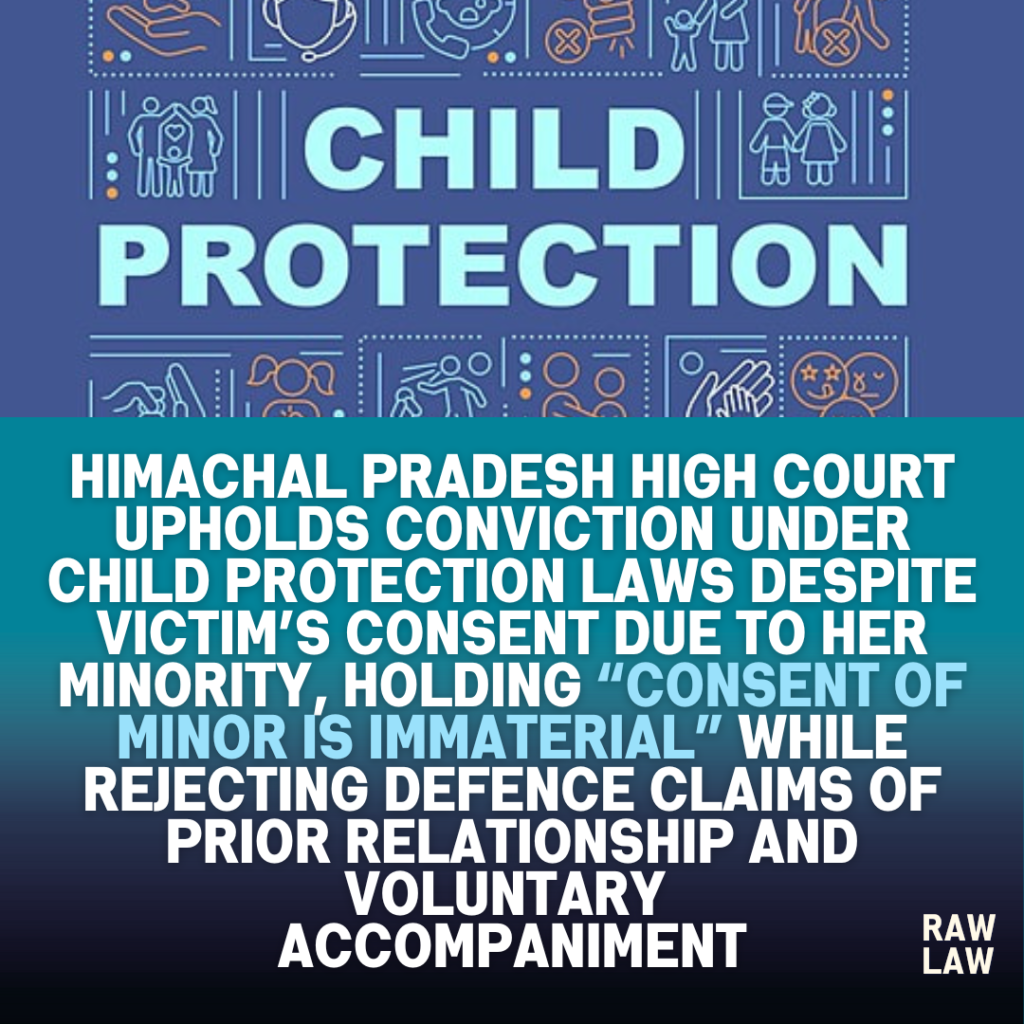Court’s Decision
The appeal challenging the conviction and sentence under Sections 363, 366 IPC and Section 4 POCSO was dismissed. The conviction and concurrent sentences of 2 years, 3 years, and 7 years respectively with fines were affirmed. The court held that victim’s consent was immaterial as she was a minor, and physical relations with her constituted statutory rape despite alleged consent.
Facts
The victim, a minor, was reported missing after leaving for school and was later found with the appellant. Investigation revealed they had travelled together, stayed in hotels, and maintained physical relations. Medical evidence showed the possibility of intercourse, and FSL confirmed the appellant’s DNA on the victim’s clothes. The victim stated she was blackmailed emotionally by the appellant. The trial court convicted the appellant under Sections 363, 366 IPC and Section 4 POCSO, leading to this appeal.
Issues
- Whether the conviction under POCSO and kidnapping provisions could sustain when the victim allegedly accompanied the appellant voluntarily.
- Whether the integrity of the case property and the credibility of evidence established the prosecution’s case beyond reasonable doubt.
- Whether consent or voluntary companionship could be a defence under the POCSO Act for a minor victim.
Petitioner’s Arguments
The appellant argued there were contradictions in prosecution evidence, the victim left voluntarily, and they had a prior consensual relationship. It was claimed the victim, being 17, knew the appellant and travelled willingly, negating kidnapping. The appellant challenged the integrity of the case property, reliability of DNA evidence, and contended consensual physical relations should not attract POCSO. Several precedents were cited to support that consent and voluntary departure should negate the charges.
Respondent’s Arguments
The State argued that the victim’s age made consent irrelevant under POCSO and kidnapping laws. The victim’s testimony, medical evidence, and FSL reports corroborated the appellant’s guilt. The integrity of the case property was established, and the prosecution’s evidence was consistent and reliable, proving the appellant’s act of taking the minor and committing sexual intercourse. The State requested dismissal of the appeal.
Analysis of the Law
The court examined Section 361 IPC, highlighting that consent of a minor is immaterial in kidnapping cases, as held in Parkash v. State of Haryana and Anversinh v. State of Gujarat. Under the POCSO Act, sexual intercourse with a minor, even with consent, constitutes statutory rape. The court noted that prior relationship or alleged consent cannot negate the offence under these laws.
Precedent Analysis
The judgment considered:
- Parkash v. State of Haryana: Minor’s consent immaterial, kidnapping offence complete upon taking minor without guardian’s consent.
- Anversinh v. State of Gujarat: Minor’s consent irrelevant, protective essence of kidnapping laws stressed.
- S. Varadarajan v. State of Madras: Distinguished, as the current case involved active inducement and planning by the accused, not mere passive accompaniment.
- Bagula Naik v. State of Orissa and State of Haryana v. Raja Ram: Reinforced that minor leaving home voluntarily does not absolve the accused if inducement or persuasion is proved.
- Surinder Kumar v. State of Punjab: Affirmed that intact seals establish integrity of case property.
These supported the court’s view that minor’s consent or voluntary travel does not nullify kidnapping and POCSO charges.
Court’s Reasoning
The court found that:
- The victim was a minor, established by birth certificate and school records.
- The appellant’s inducement and emotional blackmail led to the victim leaving home.
- The appellant actively planned and executed the travel and stay with the victim, fulfilling the ingredients of kidnapping and abduction.
- DNA evidence and medical findings corroborated the victim’s testimony about sexual intercourse.
- Minor’s alleged consent is immaterial under POCSO and IPC.
- Defence arguments regarding consent, contradictions, and integrity of evidence were rejected based on consistent prosecution evidence and intact seal confirmation on case property.
Conclusion
The High Court dismissed the appeal, affirming the appellant’s conviction under Sections 363, 366 IPC and Section 4 POCSO. It reiterated that the consent of a minor victim is immaterial, and consensual sexual relations with a minor constitute statutory rape. The trial court’s findings and sentences were upheld, and the appellant was directed to undergo the sentence as imposed.
Implications
- Reinforces that minor’s consent has no legal validity in sexual offences under POCSO and kidnapping provisions.
- Confirms that DNA evidence with intact seals is reliable for conviction.
- Upholds the protective intent of the law to prevent exploitation of minors, even in cases of prior acquaintance or voluntary companionship.
Cases Referred and Their Relevance
- Parkash v. State of Haryana: Minor’s consent immaterial for kidnapping.
- Anversinh v. State of Gujarat: Affirmed protective intent of kidnapping laws.
- S. Varadarajan v. State of Madras: Distinguished, as it involved voluntary accompaniment without inducement.
- Bagula Naik v. State of Orissa and State of Haryana v. Raja Ram: Confirmed that inducement to leave is sufficient for kidnapping.
- Surinder Kumar v. State of Punjab: Affirmed that intact seals confirm case property integrity.
These were used to reaffirm the conviction despite the victim’s alleged consent and voluntary companionship.
FAQs
1. Can consent of a minor be a defence under POCSO Act?
No, the consent of a minor is legally irrelevant under the POCSO Act, and any sexual act with a minor constitutes statutory rape.
2. Does voluntary travel with the accused by a minor negate kidnapping charges?
No, under kidnapping laws, minor’s voluntary travel does not absolve the accused if there is evidence of inducement or taking without guardian’s consent.
3. Is DNA evidence sufficient for conviction in sexual offences?
Yes, if the chain of custody is intact and seals are unbroken, DNA evidence is reliable and can form the basis for conviction in sexual offences.
